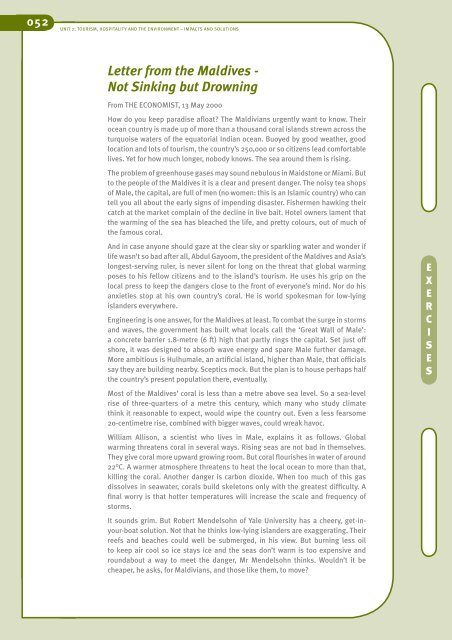Online version: PDF - DTIE
Online version: PDF - DTIE
Online version: PDF - DTIE
Create successful ePaper yourself
Turn your PDF publications into a flip-book with our unique Google optimized e-Paper software.
052<br />
UNIT 2: TOURISM, HOSPITALITY AND THE ENVIRONMENT – IMPACTS AND SOLUTIONS<br />
Letter from the Maldives -<br />
Not Sinking but Drowning<br />
From THE ECONOMIST, 13 May 2000<br />
How do you keep paradise afloat? The Maldivians urgently want to know. Their<br />
ocean country is made up of more than a thousand coral islands strewn across the<br />
turquoise waters of the equatorial Indian ocean. Buoyed by good weather, good<br />
location and lots of tourism, the country’s 250,000 or so citizens lead comfortable<br />
lives. Yet for how much longer, nobody knows. The sea around them is rising.<br />
The problem of greenhouse gases may sound nebulous in Maidstone or Miami. But<br />
to the people of the Maldives it is a clear and present danger. The noisy tea shops<br />
of Male, the capital, are full of men (no women: this is an Islamic country) who can<br />
tell you all about the early signs of impending disaster. Fishermen hawking their<br />
catch at the market complain of the decline in live bait. Hotel owners lament that<br />
the warming of the sea has bleached the life, and pretty colours, out of much of<br />
the famous coral.<br />
And in case anyone should gaze at the clear sky or sparkling water and wonder if<br />
life wasn’t so bad after all, Abdul Gayoom, the president of the Maldives and Asia’s<br />
longest-serving ruler, is never silent for long on the threat that global warming<br />
poses to his fellow citizens and to the island’s tourism. He uses his grip on the<br />
local press to keep the dangers close to the front of everyone’s mind. Nor do his<br />
anxieties stop at his own country’s coral. He is world spokesman for low-lying<br />
islanders everywhere.<br />
Engineering is one answer, for the Maldives at least. To combat the surge in storms<br />
and waves, the government has built what locals call the ‘Great Wall of Male’:<br />
a concrete barrier 1.8-metre (6 ft) high that partly rings the capital. Set just off<br />
shore, it was designed to absorb wave energy and spare Male further damage.<br />
More ambitious is Hulhumale, an artificial island, higher than Male, that officials<br />
say they are building nearby. Sceptics mock. But the plan is to house perhaps half<br />
the country’s present population there, eventually.<br />
Most of the Maldives’ coral is less than a metre above sea level. So a sea-level<br />
rise of three-quarters of a metre this century, which many who study climate<br />
think it reasonable to expect, would wipe the country out. Even a less fearsome<br />
20-centimetre rise, combined with bigger waves, could wreak havoc.<br />
William Allison, a scientist who lives in Male, explains it as follows. Global<br />
warming threatens coral in several ways. Rising seas are not bad in themselves.<br />
They give coral more upward growing room. But coral flourishes in water of around<br />
22°C. A warmer atmosphere threatens to heat the local ocean to more than that,<br />
killing the coral. Another danger is carbon dioxide. When too much of this gas<br />
dissolves in seawater, corals build skeletons only with the greatest difficulty. A<br />
final worry is that hotter temperatures will increase the scale and frequency of<br />
storms.<br />
It sounds grim. But Robert Mendelsohn of Yale University has a cheery, get-inyour-boat<br />
solution. Not that he thinks low-lying islanders are exaggerating. Their<br />
reefs and beaches could well be submerged, in his view. But burning less oil<br />
to keep air cool so ice stays ice and the seas don’t warm is too expensive and<br />
roundabout a way to meet the danger, Mr Mendelsohn thinks. Wouldn’t it be<br />
cheaper, he asks, for Maldivians, and those like them, to move?<br />
E<br />
X<br />
E<br />
R<br />
C<br />
I<br />
S<br />
E<br />
S
















